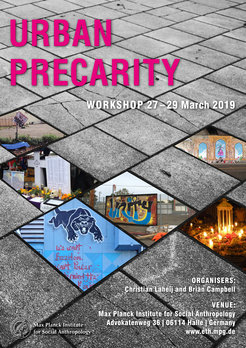Living in urban spaces – living in uncertainty
From 27 to 29 March 2019 a workshop entitled “Urban Precarity” will take place at the Max Planck Institute for Social Anthropology (MPI). Workshop participants will examine how urban life is shaped by various experiences of precariousness. Ethnographic field studies will shed light on the multifaceted aspects of precarity – here understood not only as material scarcity but also as a phenomenon that includes moral, legal, political, discursive, performative, spatial, and ecological aspects. The workshop‘s conveners are Christian Laheij and Brian Campbell of the Department ‘Integration and Conflict’. The workshop will be held in English.

Ever changing life-trajectories
Cities have long been associated with various forms of precarity. By its very nature, urban life – where relative anonymity, physical proximity to strangers, reliance on money economies, and an ever-changing built-environment converge with the transnational flows of people, ideas, and capital – can produce unique challenges in terms of vulnerability, uncertainty, and risk. “This association between urbanity and danger seems to have even intensified under the globalized regime of late capitalism”, says Dr. Christian Laheij, Research Fellow at the MPI. “Access to secure jobs and welfare is increasingly tenuous. And this can constantly alter life trajectories in unforeseen ways.” One result of this development is that migrants and impoverished classes are pushed to derelict, stigmatized neighbourhoods where they become objects of fear and disgust. And as public attention moves from Grenfell to Barcelona to Kabul, media channels routinely offer horrifying spectacles that remind the inhabitants and visitors of cities how beautiful squares and places of worship – indeed, their very homes – can become death traps, suggesting that in these vast megacities one’s neighbour might well be one’s mortal enemy.
Examining stereotypes about urban life
While stereotypes about the dangers of urban life have always dominated the social and cultural discourse about cities, they became especially widespread following industrialization in the nineteenth century. ”One goal of the workshop is to test this stereotype through the systematic comparison of empirical data, gathered from across the globe, about cities and the experiences of those who build, visit, live, and work in them”, says Dr. Brian Campbell, Research Fellow at the MPI. “Our second goal is to develop an understanding of how discourses of urban precarity are used and instrumentalised for the management of public and domestic space.” However, the workshop will not focus on just the darker sides of life in urban spaces. The workshop’s participants approach precarity as a condition of constant change and flux, where all certainties are permanently called into question. “We are interested in people’s strategies of resistance and adaption”, Christian Laheij explains. “This situation does not necessarily always result in despair and social decline but also sometimes in prosperity, hope, new meaningful relationships, and maybe a better life.”
Studying global social change
The Max Planck Institute for Social Anthropology is one of the world’s leading centres for research in socio-cultural anthropology. It was established in 1999 by Chris Hann and Günther Schlee, and moved to its permanent buildings at Advokatenweg 36 in Halle/Saale in 2001. Marie-Claire Foblets joined the Institute as Director of the Department ‘Law & Anthropology’ in 2012. Common to all research projects at the Max Planck Institute is the comparative analysis of social change; it is primarily in this domain that its researchers contribute to anthropological theory, though many programmes also have applied significance and political topicality. Fieldwork is an essential part of almost all projects. Some 175 researchers from over 30 countries currently work at the Institute. In addition, the Institute also hosts countless guest researchers who join in the scholarly discussions.
Workshop programme
Contact for this press release
Dr. Christian Laheij
Max Planck Institute for Social Anthropology
Department ‘Integration and Conflict’
Advokatenweg 36, 06114 Halle (Saale)
Tel.: 0345 2927-120
E-mail: laheij@eth.mpg.de
https://www.eth.mpg.de/laheij
Dr. Brian Campbell
Max Planck Institute for Social Anthropology
Department ‘Integration and Conflict’
Advokatenweg 36, 06114 Halle (Saale)
Tel.: 0345 2927-181
E-mail: campbell@eth.mpg.de
https://www.eth.mpg.de/campbell
PR contact
Stefan Schwendtner
Press and Public Relations
Max Planck Institute for Social Anthropology
Advokatenweg 36, 06114 Halle (Saale)
Tel.: 0345 2927-425
E-mail: schwendtner@eth.mpg.de
https://www.eth.mpg.de
